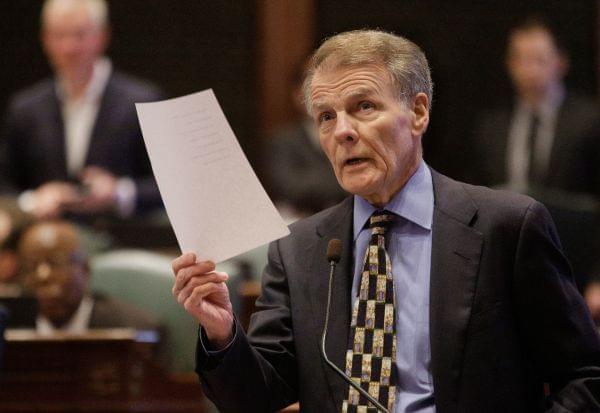Moody’s Downgrades Rating On Illinois Bonds, Second Downgrade This Week

Illinois Speaker of the House Michael Madigan, D-Chicago, speaks to lawmakers while on the House floor during session at the Illinois State Capitol Tuesday in Springfield. Democrats in the General Assembly continue attempts at flanking the Republican governor on the budget impasse, advancing legislation that would distribute money that's already been collected to local governments, lottery winners and more. Seth Perlman/AP
The Moody's credit rating agency has downgraded $26.8 billion in Illinois' general obligation bonds, saying the move was due to the state's weakening financial position during the year. On Monday, Fitch Ratings downgraded its rating on the state's outstanding bonds. Both are tied to Illinois' budget stalemate.
In lowering the bond rating to Baa1 from A3 on Thursday, Moody's Investors Service said its expectation is that the ongoing stalemate on the budget due July 1 will lead to further deterioration of the state's finances.
Democratic House Speaker Michael Madigan says it's nothing to claim victory about, or to ignore - and shows Illinois should focus on passing a budget.
"They do not talk about changes in workers' compensation, they do not talk about changes in collective bargaining, they do not talk about changes in the prevailing wage," he said.
Those are the changes Gov. Bruce Rauner wants made before he'll talk with Democrats about balancing the budget.
Rauner's office says he's not beholden to credit ratings agencies and that his agenda will help Illinois long-term. The lower a state's credit rating, the tougher - and more expensive - it is to borrow money.
In its announcement, Moody's said Illinois' structural budget imbalance, accounts payable, and other obligations "are back-tracking, despite a favorable economic climate, leaving the state more vulnerable to the next economic downturn,'' barring swift corrective actions.
Links
- Rauner Bites Back At Edgar, Thompson Critiques
- Madigan: “Campaign Purposes” Behind Rauner’s Term Limits, Redistricting Push
- Rauner Wants Budget In 60-90 Days, Sees Chicago Fiscal Mess As Leverage Point
- Amid Budget Impasse, Universities Hurting But See Some Good In Rauner Plan
- Rauner Blames Democrats For Three Months Of No Funding For Colleges
- Rauner: Budget Standoff ‘Could Go On For A While’
- Proxy Wars: Meet The Rauner Aide Driving Democrats Crazy
- It’s Been Months Since Gov. Rauner Met With All Four Legislative Leaders — Does It Matter?
